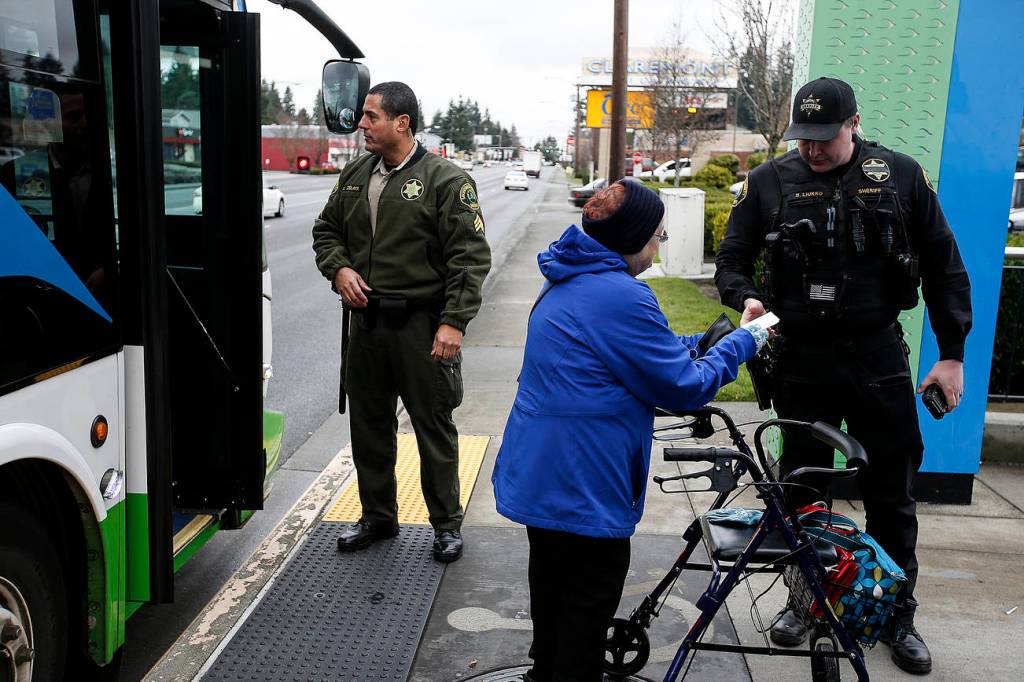They check tickets, help riders, sometimes get screamed at
Published 1:30 am Friday, January 12, 2018




EVERETT — The young woman in a beige, grease-stained fast food apron was not having a good day. She stomped off the Swift Blue Line, and slammed a paper Popeyes cup onto the metal seat of the bus stop, like a football player spiking the ball after a touchdown.
Soda sailed through the air and splashed Sgt. Marty Zelaya.
“I lost my ticket, sir!” she shouted. “Yes, I did pay, because I had my ticket, from this morning! Well, I’m pissed the (heck) off! I just had it! That’s what I’m trying to say to you! I just had it! I just had my ticket! You can think whatever you want, sir! I’m not going to sit here and try to argue with you.”
It was the second time in a few hours she’d been caught without a ticket. Zelaya started to explain his options. He could ban her from the bus for 30 days.
“Do it then!” she cut him off. “If that’s what you need to do!”
She got her wish.
You’d be amazed, Zelaya said, at how upset people get when they’re called out for not paying $2.25.
Thirteen Snohomish County sheriff’s deputies patrol Community Transit’s fleet of nearly 300 buses, as part of a security contract with the sheriff’s office worth $1.7 million a year, according to the transit service. The agency runs all bus routes in the county, except for Everett Transit buses.
Seven more deputies will join the transit unit over the next three years, under a new budget that nearly doubles the contract with the sheriff’s office. The unit is tasked with responding to disturbances on buses and commuter rail around the county, stopping break-ins at park-and-ride lots, and making sure people are paying fares. Security will be boosted in tandem with a major route expansion, the Swift Green Line. It will bring rapid service to Bothell, Mill Creek and Boeing’s Everett site.
The Blue Line runs along Highway 99, from central Everett to Shoreline. The latest data show about 1.6 million boardings on the line in a year. A month-long survey in fall found an average of 42 people were boarding each Swift bus per hour.
Most are honest paying customers. An estimated one in every five riders on the route dodges their fare. On other local routes, the fare-evasion rate is about 2 percent.
Fare-dodging siphons away about $1 million per year in Snohomish County.
Why is it so prevalent on the Swift line? Because speed has its pitfalls. To make the service faster, you pay your way with an Orca card, or else you buy a ticket before boarding. Bus drivers don’t ask for payment. It’s basically the honor system — until deputies or one of three Swift ambassadors show up.
Ambassadors are employees of Community Transit. They spend their day helping people to board, giving directions and checking for fare evaders. Isaiah Smith, 28, comes from a whole family in transit. His father drives buses. His mother-in-law trains drivers. And after a surgery and a spell of unemployment in 2016, they suggested that he apply for a ticket-checking job.
Now he grows his beard out to look a little less baby-faced, a little more in charge, when he boards the bus with a gizmo that lets him check each ticket and Orca card in seconds.
Most riders, he said, are happy to see him. But he has to be on guard. He goes through annual crisis training to de-escalate confrontations with agitated people. He uses his training often. When he worked solo, he’d get screamed at a few times a week. Ambassadors recently started working in pairs. That has helped.
“We have to use nothing but our wits and our words to get out of some sticky situations,” he said. “When you apply for the job, you don’t exactly know you’re basically counseling mentally ill people. We’re talking to them every day, and helping them out. (We deal with) mental illness, addiction, everything.”
He’s seen fights. People have threatened to slit his throat. Coworkers have been spit on.
“I’ve been on the back of the bus and had a guy with a heroin needle in his arm, passed out, and kids were running around,” he said.
Sometimes, Smith admits he prefers the ones who run off. At least they’re avoiding conflict. As for excuses, he’s heard some bad ones. “Stolen wallet” is at the top of the list right now. Then some people claim to have thrown their ticket away, not knowing they had to hang onto it, even though the tickets have a warning not to do that. One guy said a dog ate his ticket.
“Ha, funny,” Smith recalled telling him, deadpan. “Hop off and pay for another one, then.”
A first offense usually means a warning. The second time, it can be a $124 ticket. After that, it’s a temporary ban from riding the bus and the Sounder train. Since it’s theft, deputies can skip straight to arrest, at their discretion. Every other week or so, a team of them will wait at a bus stop to pick off violators, or hop onto buses and ride along to check tickets for a few stops. Word gets out fast. So they switch up the days of the week, and what parts of the route they’re focused on.
This week on a fare enforcement day, about a half-dozen deputies in heavy tan-and-green coats watched the reader board for the next incoming bus at Evergreen Way and 50th Street. Across the highway at another stop, deputies were arresting a frequent offender, “a chronic no-pay,” Smith said. They know him by name.
A bus rolled up. Three doors opened. Smith went in and walked the aisle; the deputies guarded the exits; a few people hopped off; a few were ordered off; and a few were detained while deputies checked them for warrants. For minors, they’ll check if they’ve been reported as a runaway.
Every few minutes, the routine repeated. Often there were as many violators as deputies. Some deputies had to drive people to jail, thinning the team and making Zelaya a little anxious.
“All it takes is for one of these guys to run,” said Zelaya, who has been a deputy for 15 years. “And that happens.”
Zelaya remembers the first fare-dodger who tried to flee him. It was his first day shifting from patrol to the transit unit, his first five minutes on the new beat.
Not long after, another guy.
”I swear, he didn’t even look at traffic,” he said. “He just ran. We had to cuff him right in the middle of Highway 99, here. That’s another reason for the numbers: Usually if they see there’s too many deputies, they’re less likely to run and fight. At least that’s the hope.”
Caleb Hutton: 425-339-3454; chutton@heraldnet.com. Twitter: @snocaleb.








